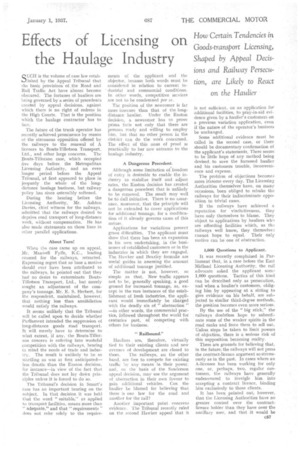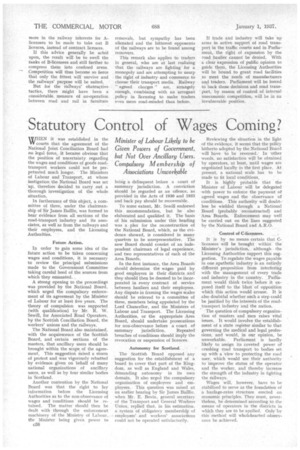Effects of Licensing on the Haulage Industry
Page 107

Page 108

If you've noticed an error in this article please click here to report it so we can fix it.
How Certain Tendencies in Goods-transport Licensing, Shaped by Appeal Decisions and Railway Persecution, are Likely to React
on the Haulier
SUCH estab
lishedis the volume of case law estalished by the Appeal Tribunal that the basic provisions of, the Road and Rail Traffic Act have almost become obscured. The fortunes of hauliers are being governed by a series of precedents created by appeal decisions, against which there is no right of redress in the High Courts. That is the position which the haulage contractor has to face.
The future of the trunk operator has recently achieved prominence by reason of the strenuous opposition offered by the railways to the renewal of A licences to Bouts-Tillotson Transport, Ltd., and other large concerns. The Bouts-Tillotson case, which occupied five days before the Metropolitan Licensing Authority, and an even longer period before the Appeal Tribunal, at first appeared to place in jeopardy . the whole of the longdistance haulage business, but railway policy has since ostensibly softened.
During the hearing before the Licensing Authority, Mr. Ashton Davies, chief witness for the railways, admitted that the railways desired to deprive road transport of long-distance work, without compensation. He has also made statements on those lines in other parallel applications.
About Turn!
When the case came up on appeal, Mr. MaxWell Fyffe, E.C., leading counsel for the railways, retracted. Expressing regret that so base a motive should ever have been attributed to the railways, he pointed out that they had no desire to exterminate BoutsTillotson Transport, Ltd., but merely sought an adjustment of the company's tonnage. Mr. E. S. Herbert, for the respondent, maintained, however, that nothing less than annihilation would satisfy the railways.
It seems unlikely that the Tribunal will be called upon to decide whether Parliament intended the suppression of long-distance goods road transport. It will merely have to determine to what extent, if any, the Bouts-Tillotson concern is entering into wasteful competition with the railways, bearing in mind the needs of trade and industry. The result is unlikely to be so startling as was at first anticipated— less drastic than the Enston decision, for instance—in view of the fact that the Tribunal does not lay doWn principles unless it is forced to do so.
The Tribunal's decision in Smart's case has an important bearing on the subject. In that decision it was held that the word " suitable," as applied to transport facilities, means more than "adequate," and that " requirements " does not refer solely to the require ments of the applicant and the objector, because both words must be considered in relation to current industrial and commercial conditions. In other words, competitive services are not to be condemned per se.
The position of the newcomer is far more insecure than that of the longdistance haulier. Under the Enston decision, a newcomer has to prove prima facie not only that there are persons ready and willing to employ him, but that no other. person in the district can do the work concerned. The effect of this onus of proof is practically to bar new entrants to the haulage industry.
A Dangerous Precedent.
Although some limitation of freedom of entry is desirable to enable the industry to stabilize itself and adjust rates, the Enston decision has created a dangerous precedent that is unlikely to be removed. The result may well be to dull initiative. There is no assurance, moreover, that the principle will not he extended to cover applications for additional tonnage, for a modification of it already governs cases of this nature.
Applications for variations present grave difficulties. The applicant must show that there has been an expansion in his own undertaking, in the businesses of established customers or in the industries in which they are engaged. The Hawker and Beazley formulae are useful guides in assessing the amount of additional tonnage justified.
The matter is not, however, so simple as that. New traffic appears not to be, generally speaking, a good ground for increased, tonnage, as, except in the rare instances of the establishment of fresh industries, the applicant would immediately be charged with the deadly sin of " abstraction " —in other words, the commercial practice, followed throughOut the world for centuries past, of competing with others for business.
" Railbound."
Hauliers . are, therefore, virtually tied to their existing clients and new avenues of development are closed to them. The railways, on the other hand, are free to compete for existing traffic by any means in their power, and, on the basis of the Sandman appeal decision, may use the argument of abstraction in their own favour to gain additional vehicles. Can the haulier be blamed for believing that there is one law for the road and another for the rail?
Another important point concerns evidence. The Tribunal recently ruled on the second Hawker appeal that it is not sufficient, on an application for additional facilities, to pray-in-aid evidence given by a haulier's customers on a previous variation application, even if the nature of the operator's business be unchanged.
Some additional evidence must be called in the second case, or there should be documentary confirmation of the applicant's statements, There seems to be little hope of any method being devised, to save the harassed haulier and his customers trouble, inconvenience and expense.
The problem of objections becomes more irksome every day. The Licensing Authorities themselves have, on many occasions, been obliged to rebuke the railways for their indiscriminate opposition to trivial cases.
If the railways have achieved a reputation for vindictiveness, they have only themselves to blame. They object to applications by hauliers whn are affording facilities which, as the railways well know, they themselves cannot hope to equal. Their only motive can be one of obstruction.
1,000 Questions to Applicant.
It was recently complained in Parliament that, in a case before the East Midland Licensing Authority, the rail advocate asked the applicant some 1,000 questions. Tactics of this kind can be described only as persecution, and when a haulier's customers, obliging him by appearing at a sitting to give evidence on his behalf, are subjected to similar third-degree methods, the position becomes even more serious. By the use of the " big stick." the railways doubtless hope to subordinate some of the weaker spirits in the road ranks and force them to sell out.
• Unless steps be taken to limit powers of objection, there is a serious risk of this supposition becoming reality.
There are grounds for believing that, in the future, the railways will not press the contract-licence argument so strenuously as in the past. In cases where an A-licensee has been working for only one, or, perhaps, two, regular customers, the railways have generally endeavoured to inveigle him into accepting a contract licence, binding him exclusively to those clients.
It has been pointed out, however, that the Licensing Authorities have no greater control over the .contractlicence holder than they have over the ancillary user, and that it would be more in the railway interests for A-. licensees to be made to take out B licences, instead of contract licences.
If this advice generally be acted upon, the result will be to swell the ranks of B-licensees and still further to compress them into confined areas. Competition will thus become so fierce that only the fittest will survive and the railways purpose will be suited.
But for the raihvays' obstructive tactics, there might have been a considerable measure of co-operation between road and rail in furniture removals, but sympathy has been alienated and the bitterest opponents of the railways are to be found among removers, This remark also applies to traders in general, who are at last realizing that the railways are fighting for a monopoly and are attempting to usurp the right of industry and commerce to choose their transport media. Railway agreed charges" are, strangely enough, combining with an arrogant policy in licensing to make traders even more road-minded than before. If trade and industry will take up arms in active support of road transport in the traffic courts and in Parliament, the right of expansion by the road haulier cannot be denied. With a clear expression of public opinion to guide them, the Licensing Authorities will be bound to grant road facilities to meet the needs of manufacturers and traders. Parliament will be forced to back those decisions and road transport, by reason of control of internal . uneconomic competition, will be in an invulnerable position.




























































































































































